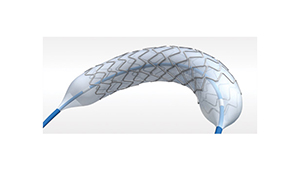Elixir Medical ‘s novolimus-eluting stent, DeSyne, outperformed Medtronic‘s (NYSE:MDT) zotarolimus-eluting stent, Endeavor, according to long-term data from Elixir’s Excella II trial.
‘s novolimus-eluting stent, DeSyne, outperformed Medtronic‘s (NYSE:MDT) zotarolimus-eluting stent, Endeavor, according to long-term data from Elixir’s Excella II trial.
The study enrolled 210 patients with 2 or more de novo lesions in 2 different epicardial vessels. Researchers randomly assigned patients in a 2:1 ratio to the novolimus-eluting stent or the zotarolimus-eluting stent.
The device emits a low dose of either novolimus or zotarolimus from a thin coating around the stent system. The thin polymer coating degrades over the course of 6 – 9 months, leaving behind a bare metal cobalt chromium stent.
Previous work has shown both noninferiority and superiority of the novolimus-eluting stent compared to the zotarlimus-eluting stent for in-stent lumen loss.
In the long-term, 5 year follow-up study, researchers observed that Elixir’s stent was associated with lower incidence of the patient-oriented composite endpoint, including death, myocardial infarction and revascularization. The data also showed that Elixir’s device was associated with a lower incidence of the device-oriented composite endpoint, including cardiac death and clinically indicated target lesion revascularization.
While there was no difference in cardiac death and definite stent thrombosis between the 2 groups, the researchers said that Elixir’s DeSyne stent was associated with a trend toward reduction in myocardial infarction and repeat revascularization.
Elixir won CE Mark approval for its DeSyne stent in 2012, based on results from the Excella BD study which compared the drug-eluting stent to Medtronic’s Endeavor system.
At 6 months, DeSyne proved superior to Endeavor for in-stent late lumen loss and binary restenosis, according to the company.
In May 2012, Elixir touted 1st-in-man clinical results for its DeSolve fully bioabsorbable drug-eluting scaffold system, which is also coated in novolimus. Unlike the company’s DeSyne stent, which degrades and leaves behind a bare metal implant, DeSolve is designed to be absorbed by the body in 1-2 years.
The DeSolve study observed 15 patients over 6 months, finding “excellent” late lumen loss, no re-blockage of the artery, no incidents of stent thrombosis and 1 major adverse cardiac event, according to a press release.

Nice Article .Thanks For Sharing